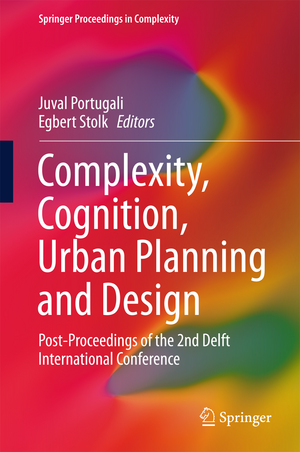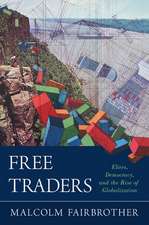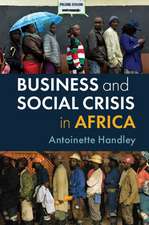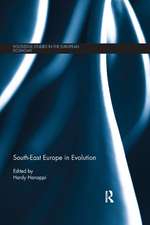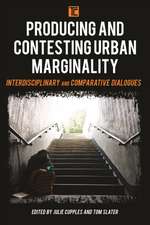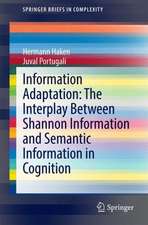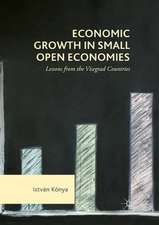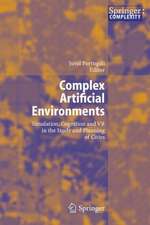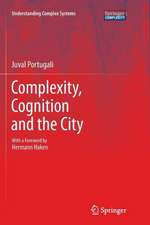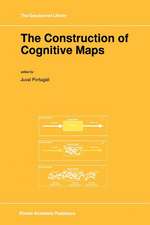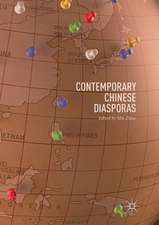Complexity, Cognition, Urban Planning and Design: Post-Proceedings of the 2nd Delft International Conference: Springer Proceedings in Complexity
Editat de Juval Portugali, Egbert Stolken Limba Engleză Hardback – 20 mai 2016
| Toate formatele și edițiile | Preț | Express |
|---|---|---|
| Paperback (1) | 1219.01 lei 6-8 săpt. | |
| Springer International Publishing – 27 mai 2018 | 1219.01 lei 6-8 săpt. | |
| Hardback (1) | 1225.16 lei 6-8 săpt. | |
| Springer International Publishing – 20 mai 2016 | 1225.16 lei 6-8 săpt. |
Din seria Springer Proceedings in Complexity
- 20%
 Preț: 1128.80 lei
Preț: 1128.80 lei - 18%
 Preț: 1240.16 lei
Preț: 1240.16 lei - 18%
 Preț: 1214.09 lei
Preț: 1214.09 lei -
 Preț: 497.13 lei
Preț: 497.13 lei - 18%
 Preț: 1112.30 lei
Preț: 1112.30 lei - 18%
 Preț: 1300.10 lei
Preț: 1300.10 lei - 20%
 Preț: 1084.83 lei
Preț: 1084.83 lei - 18%
 Preț: 1393.27 lei
Preț: 1393.27 lei - 18%
 Preț: 961.55 lei
Preț: 961.55 lei - 20%
 Preț: 646.95 lei
Preț: 646.95 lei - 15%
 Preț: 641.71 lei
Preț: 641.71 lei - 18%
 Preț: 1395.32 lei
Preț: 1395.32 lei - 18%
 Preț: 952.89 lei
Preț: 952.89 lei - 20%
 Preț: 646.12 lei
Preț: 646.12 lei - 20%
 Preț: 571.27 lei
Preț: 571.27 lei - 20%
 Preț: 1288.76 lei
Preț: 1288.76 lei - 18%
 Preț: 1125.55 lei
Preț: 1125.55 lei - 15%
 Preț: 643.34 lei
Preț: 643.34 lei - 18%
 Preț: 947.04 lei
Preț: 947.04 lei - 24%
 Preț: 839.38 lei
Preț: 839.38 lei - 18%
 Preț: 1251.98 lei
Preț: 1251.98 lei - 18%
 Preț: 1670.11 lei
Preț: 1670.11 lei - 18%
 Preț: 1223.25 lei
Preț: 1223.25 lei - 18%
 Preț: 974.04 lei
Preț: 974.04 lei - 15%
 Preț: 646.11 lei
Preț: 646.11 lei - 15%
 Preț: 645.79 lei
Preț: 645.79 lei - 18%
 Preț: 957.32 lei
Preț: 957.32 lei - 20%
 Preț: 984.18 lei
Preț: 984.18 lei - 15%
 Preț: 643.84 lei
Preț: 643.84 lei - 15%
 Preț: 644.63 lei
Preț: 644.63 lei - 18%
 Preț: 1236.51 lei
Preț: 1236.51 lei - 18%
 Preț: 1223.25 lei
Preț: 1223.25 lei - 18%
 Preț: 964.86 lei
Preț: 964.86 lei - 18%
 Preț: 1278.82 lei
Preț: 1278.82 lei - 18%
 Preț: 1217.41 lei
Preț: 1217.41 lei - 24%
 Preț: 1067.23 lei
Preț: 1067.23 lei -
 Preț: 424.99 lei
Preț: 424.99 lei - 18%
 Preț: 1236.69 lei
Preț: 1236.69 lei - 20%
 Preț: 1277.57 lei
Preț: 1277.57 lei -
 Preț: 424.81 lei
Preț: 424.81 lei - 24%
 Preț: 1084.90 lei
Preț: 1084.90 lei
Preț: 1225.16 lei
Preț vechi: 1494.10 lei
-18% Nou
Puncte Express: 1838
Preț estimativ în valută:
234.49€ • 243.89$ • 196.51£
234.49€ • 243.89$ • 196.51£
Carte tipărită la comandă
Livrare economică 13-27 martie
Preluare comenzi: 021 569.72.76
Specificații
ISBN-13: 9783319326511
ISBN-10: 3319326511
Pagini: 380
Ilustrații: XXVI, 316 p. 110 illus., 63 illus. in color.
Dimensiuni: 155 x 235 x 21 mm
Greutate: 0.66 kg
Ediția:1st ed. 2016
Editura: Springer International Publishing
Colecția Springer
Seria Springer Proceedings in Complexity
Locul publicării:Cham, Switzerland
ISBN-10: 3319326511
Pagini: 380
Ilustrații: XXVI, 316 p. 110 illus., 63 illus. in color.
Dimensiuni: 155 x 235 x 21 mm
Greutate: 0.66 kg
Ediția:1st ed. 2016
Editura: Springer International Publishing
Colecția Springer
Seria Springer Proceedings in Complexity
Locul publicării:Cham, Switzerland
Cuprins
Introduction.- Part I: Complexity, Cognition and Cities.- 1. What makes cities complex?.- 2. Evolving a Plan: Design and Planning with Complexity.- 3. Self-organization and design as complementary pair.- 4. Cultivating complexity: The need for a shift in cognition.- 5. The fourth sustainability, creativity: Statistical associations and credible mechanism.- 6. Design thinking as principles for the structure of creative cities.- Part II: On Termites, Rats and Cities.- 7. Swarm cognition and swarm construction. Lessons from a social insect master builder.- 8. Physical, Behavioral, and Spatiotemporal Perspectives of Home in Humans and other Animals.- Part III: Complexity, Cognition and Planning.- 9. Framing the Planning Game: A cognitive understanding of the planner’s rationale in a differentiated world.- 10. Global scale predictions of cities in urban and in cognitive planning.- 11. Emotional cognition and urban planning.- Part IV: Complexity, Cognition and Design.- 12. A Complexity-Cognitive view on Scale in Urban Design.- 13. Lines: Orderly and Messy.
Textul de pe ultima copertă
This book, which resulted from an intensive discourse between experts from several disciplines – complexity theorists, cognitive scientists, philosophers, urban planners and urban designers, as well as a zoologist and a physiologist – addresses various issues regarding cities. It is a first step in responding to the challenge of generating just such a discourse, based on a dilemma identified in the CTC (Complexity Theories of Cities) domain. The latter has demonstrated that cities exhibit the properties of natural, organic complex systems: they are open, complex and bottom-up, have fractal structures and are often chaotic. CTC have further shown that many of the mathematical formalisms and models developed to study material and organic complex systems also apply to cities. The dilemma in the current state of CTC is that cities differ from natural complex systems in that they are hybrid complex systems composed, on the one hand, of artifacts such as buildings, roads and bridges, and ofnatural human agents on the other. This raises a plethora of new questions on the difference between the natural and the artificial, the cognitive origin of human action and behavior, and the role of planning and designing cities. The answers to these questions cannot come from a single discipline; they must instead emerge from a discourse between experts from several disciplines engaged in CTC.
Caracteristici
Includes supplementary material: sn.pub/extras
